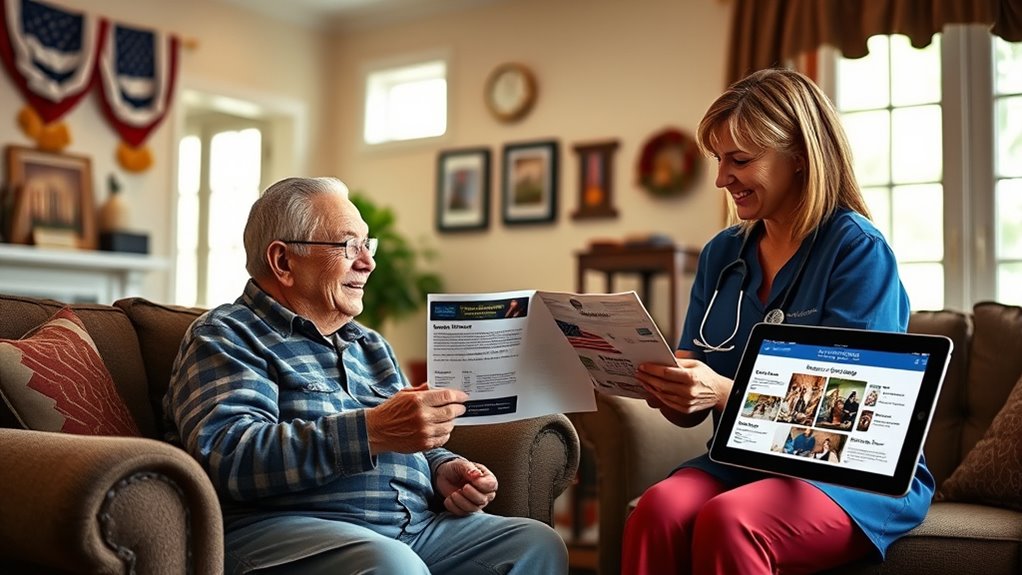If you’re a veteran seeking home-care services, you may qualify for benefits that cover medical equipment, home modifications, and caregiver support. Eligibility depends on your discharge status and health needs, with application processes that involve paperwork and medical evaluations. These benefits aim to improve your safety and independence at home. To get the most from these services and discover additional support options, explore this guide further.
Key Takeaways
- VA offers home modifications, caregiver support, and medical equipment coverage for eligible veterans with service-connected disabilities.
- Eligibility requires honorable or general discharge, with benefits tailored to health needs and service connection status.
- Covered services include companion care, skilled nursing, therapy, and assistance with medical equipment.
- Maintaining communication, detailed records, and proactive scheduling optimize benefit utilization and care coordination.
- Veterans can access community resources, training, and support groups to enhance home care and maximize benefits.
Overview of VA Home-Care Benefits

If you’re a veteran seeking assistance at home, the VA offers a range of benefits designed to support your needs. These benefits include home modifications that make your living space safer and more accessible, such as ramps, grab bars, and widened doorways. The VA also provides caregiver support programs, helping family members or loved ones who assist with daily activities. These services aim to improve your quality of life while easing the burden on caregivers. You may qualify for these benefits if you have service-connected disabilities or specific health needs. The goal is to create a comfortable, accessible environment where you can maintain independence and receive the care you need right at home. Understanding accessibility modifications can help you better navigate the available options and enhance your living space.
Eligibility Requirements for Veterans

To qualify for VA home-care benefits, you must meet specific eligibility criteria based on your military service, health status, and current needs. Your military discharge status is vital; you generally need an honorable or general discharge. If you have a service-connected disability, it strengthens your case, especially if it requires ongoing care. Eligibility also depends on your current health condition and whether you need assistance with daily activities. Additionally, understanding filial responsibility laws can impact your planning if family members are involved in support responsibilities. Meeting these requirements helps guarantee you access the benefits you’re entitled to.
Types of Home-Care Services Covered

What types of home-care services does the VA cover to support your health and daily needs? The VA offers a range of services, including companion services that provide social interaction and assistance with daily activities. These services help reduce loneliness and improve your overall well-being. Additionally, the VA covers medical equipment such as mobility aids, hospital beds, and personal care devices, ensuring you have the necessary tools to stay safe at home. Skilled nursing care and therapy services may also be available if your condition requires more specialized attention. These benefits aim to promote independence and comfort, allowing you to maintain a quality life within your own home. Support hours can influence the availability of some services, so it is helpful to check local resources or contact your VA representative for specific details. Always check your specific eligibility, as coverage details can vary based on your individual circumstances.
How to Apply for Home-Care Assistance

Ready to start the process of receiving home-care assistance through the VA? First, gather your military service records and schedule a medical evaluation. You’ll need to apply through your local VA office or online via the VA’s website. Be prepared to discuss your specific care needs and how they impact your daily life. Additionally, understanding the beneficial ingredients in certain treatments can help you communicate your needs more effectively during consultations.
- Understand your eligibility criteria, including veteran employment status and service-connected disabilities
- Explore available travel discounts that may assist with appointment visits
- Connect with a VA case manager to streamline your application
- Keep copies of all documents for future reference
- Stay proactive about follow-up appointments and assessments
Applying for VA home-care benefits is a step toward improved quality of life, ensuring you get the support you deserve.
Additional Support Programs and Resources

Once you’ve completed the application process for VA home-care assistance, it’s helpful to explore additional support programs and resources that can further enhance your well-being. Community partnerships often offer specialized services, social activities, and health resources tailored for veterans. These collaborations create a network of support that extends beyond medical care, fostering a sense of belonging. Caregiver training programs are also available to help your loved ones develop essential skills, ensuring better care and reducing stress. Visualize the following support options:
| Community Partnerships | Caregiver Training |
|---|---|
| Local health clinics | Skill workshops |
| Veteran support groups | Respite care |
| Social activities | Certification courses |
Additionally, understanding anime culture can provide a relaxing and enjoyable way to unwind and connect with broader cultural interests.
Tips for Maximizing Benefits and Care Quality

To get the most out of your benefits, start by understanding the eligibility requirements and ensuring you meet them. Next, focus on optimizing how you use your benefits to cover essential care needs. Finally, coordinate your care with providers to improve quality and avoid gaps in services. Being aware of paint sprayer maintenance can also help prolong the lifespan of your equipment and ensure consistent performance.
Understand Eligibility Requirements
Understanding the eligibility requirements for veteran home-care benefits is essential to guarantee you receive the maximum support available. Many benefits misconceptions can lead to missed opportunities, so verifying your eligibility is vital. To ensure accurate eligibility verification, review your service history, disability status, and income level. Keep in mind that eligibility varies based on factors like service period, discharge status, and medical needs. Familiarize yourself with Alimony laws which can influence financial assessments and benefit determinations.
- Confirm your service records and discharge papers
- Check if your disability rating qualifies you
- Understand income and asset limits for specific programs
- Be aware of any recent changes in benefit regulations
- Seek guidance from VA representatives to clarify doubts
Optimize Benefit Utilization
Are you making the most of your veteran home-care benefits? Proper benefits planning helps you allocate resources effectively, guaranteeing you get the care you need without overspending. Start by reviewing all available services and understanding your coverage limits. Keep detailed records of your care needs and expenses to identify areas where benefits can be maximized. Service coordination plays a vital role—working with your providers and VA representatives ensures your care plan aligns with your benefits. Regularly communicate your changing needs to avoid gaps or underutilization. By actively managing your benefits and coordinating services, you enhance care quality while making the most of your entitlement. Staying informed and organized empowers you to navigate the system efficiently and achieve better health outcomes. Understanding benefits and resources can further help you optimize your support options.
Coordinate Care Effectively
Effective care coordination guarantees you’re getting the most from your veteran home-care benefits while maintaining high-quality support. To do this, stay organized by regularly communicating with your caregiver support team and sharing updates about your needs. Make certain your medical equipment is functioning properly and accessible, preventing delays or issues. Coordinate appointments with healthcare providers to avoid overlaps and gaps. Keep detailed records of treatments and services received, which helps streamline billing and benefits utilization. Regularly review your care plan to adapt to changing needs. Incorporate the latest innovations in veteran home care to ensure you are utilizing the most effective tools and resources available.
- Maintain open communication with your caregiver support network
- Keep all medical equipment in good working order
- Schedule and confirm appointments in advance
- Track your services and expenses carefully
- Adjust your care plan as your condition evolves
Common Challenges and How to Overcome Them

Navigating the world of veteran home-care benefits can present several obstacles, from complex application processes to limited provider options. Common challenges include caregiver communication issues and scheduling conflicts. To overcome these, stay proactive: clearly communicate your needs and expectations, and confirm appointments ahead of time. Building a strong relationship with your care team helps ensure everyone’s on the same page. Additionally, understanding personalized in-home care options can help tailor services to better meet individual needs. Here’s a quick guide:
| Challenge | Solution | Tip |
|---|---|---|
| Caregiver communication | Keep detailed records and ask questions | Use written communication when possible |
| Scheduling conflicts | Maintain a shared calendar | Confirm appointments 24 hours in advance |
| Limited provider options | Research and request referrals | Contact veteran support groups for recommendations |
Frequently Asked Questions
Can Veterans Choose Private Home-Care Providers With VA Benefits?
You can choose private providers for home-care services if you meet the VA’s eligibility criteria. The VA allows veterans to select certified private providers through programs like the Veteran Choice Program or VA’s Community Care Network. Make sure your situation qualifies, as eligibility criteria vary based on your service-connected disabilities and local VA policies. Always confirm that the private provider is approved by the VA to ensure coverage and quality care.
Are There Limits on the Number of Hours Covered per Week?
Did you know that VA home-care benefits typically cover an average of 20 hours per week? You should know there are coverage restrictions and benefit duration limits that vary depending on your specific needs and eligibility. While you can choose private providers, the hours covered are often capped, so it is crucial to check your local VA’s policies. Always confirm your benefit duration and hours to avoid unexpected out-of-pocket costs.
Do Benefits Vary by Geographic Location or State?
You might wonder if veteran benefits for home-care services change depending on where you live. Regional differences and state policies can impact the coverage, as some states offer additional support or have different eligibility criteria. While the core benefits are federally managed, the specifics can vary widely based on your location. It is crucial to check your state’s regulations and programs to understand exactly what benefits you can access in your area.
How Often Can Veterans Reapply or Update Their Benefits?
Imagine your benefits are a garden that needs tending. You can reapply or update your benefits as often as needed, much like watering your plants. Benefits renewal depends on your ongoing eligibility, and you should regularly check for eligibility updates to keep your benefits thriving. There’s no set limit—stay proactive, and you can refresh your benefits whenever circumstances change, ensuring your support continues to grow.
Are Family Members Eligible for Any Training or Support Programs?
You should know that family members can access family training and caregiver support programs. These programs help you learn how to provide effective care and manage your loved one’s needs. By participating, you gain valuable skills and emotional support, making caregiving easier. Check with your local veteran service office or VA resources to find out specific programs available to you, ensuring you’re well-equipped to support your veteran family member.
Conclusion
Steering veteran home-care benefits is like steering a ship through calm waters—you can reach your destination with the right guidance. By understanding your options and asking for help when needed, you’ll guarantee your journey is smooth and your needs are met. Remember, these benefits are your compass, guiding you toward comfort and independence. Embrace the support available, and let it be the steady anchor that keeps you secure on your path forward.









